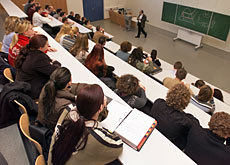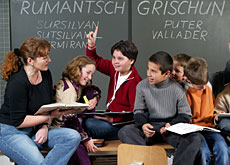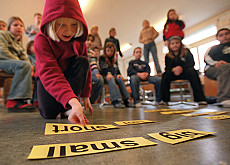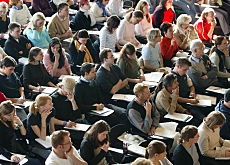English makes inroads at Swiss universities

Switzerland already has four languages, but as far as its universities are concerned is fast acquiring a fifth one - English.
Experts say the country has long welcomed foreign scholars and sent its own students abroad. But the rise of English reflects Swiss universities’ more global outlook, as well as the effects of the Bologna reforms.
Switzerland’s neighbours, and Germany in particular, still provide the bulk of non-Swiss students and staff. However, the intake from other countries is on the rise.
Of non-European countries, China has the most foreign students in Switzerland. India and Russia also have important contingents. Switzerland has the highest proportion of foreign students in Europe, second only to Australia worldwide.
The Rectors’ Conference of the Swiss Universities, the universities’ umbrella organisation, welcomes this development, which it sees as a two-way street.
“We’re trying to encourage our students to become mobile. We want to send them away and have other students coming, and to promote ‘brain circulation’,” the organisation’s Johanna Ziberi told swissinfo.
“If you want to attract foreign students, you will best do it by having courses in English,” said Ziberi, who is responsible for promoting contacts between Swiss and foreign universities. “English is the language of academia.”
But parliament remains divided over whether English should be made the first foreign language taught at schools. The Senate on Tuesday decided against a clause in a new language law forcing schools to teach a second national language – German, French, Italian, Romansh – before English.
European cooperation
The use of English is not new in Swiss universities, but it has gained in importance over the past decade.
The Bologna Declaration of 1999, designed to create a European space for higher education, means that universities all over Europe are dropping their national focus.
As a result they are offering courses at least at Master’s level in English. Switzerland is very much involved in this movement.
At the Federal Institute of Technology in Zurich two thirds of the Master’s programmes are offered in a way that students do not need to know German, according to Anders Hagström, responsible for international relations at the institute.
Another reason is the changing of generations.
“The early baby boomer generation has retired in the past ten years. I would say 80 per cent of professors have been recruited in the last ten years. Almost without exception they have had a stint in North America in their previous career,” Hagström told swissinfo.
Emerging research areas
A third reason is that top research universities, like the institute, are deeply involved in emerging areas of science, including biomedical engineering, micro- and nanosystems, and computational biology.
“Because they are emerging research areas, they are also areas where the institution is looking for new talent, new researchers,” Hagström explained.
“One of the key reasons why those programmes are open to an international audience is to attract potential doctoral students,” he added.
The two federal institutes of technology – the other is in Lausanne – pride themselves on the proportion of foreign students and staff. At the institute in Zurich around 60 per cent of the teachers and 56 per cent of the doctoral students are foreigners. The research environment is exclusively English speaking.
Hagström is convinced that Switzerland benefits greatly from the influx of foreign students.
Many of them subsequently make an important contribution to the Swiss economy, whether employed by one of the Swiss companies always eager to snap up graduates of prestigious universities, or by launching their own start-ups.
The presence of dynamic and ambitious students also benefits the universities. “From the institution’s point of view it’s very important to have this fresh wind coming in,” said Hagström.
swissinfo, Julia Slater
Switzerland has two federal institutes of technology and ten universities.
Almost 23% of students at Swiss universities are foreigners.
Switzerland has four national languages, German, French, Italian and Romansh.
Swiss children used to learn another national language as their first foreign language.
Some of the German-speaking cantons have now replaced this with English.
More than 380 million people speak English as their first language, fewer than Chinese or Spanish.
However, it is the most widely taught as a second language, and it is estimated that over a billion people worldwide have at least a basic knowledge of it.
English is an official language in 53 countries.
It is one of the six official languages of the UN and one of the three working languages of the EU.
The gap between languages with many speakers and those with few speakers continues to grow.
It is predicted that of the 7,000 languages currently spoken in the world, around half will have disappeared by 2100.

In compliance with the JTI standards
More: SWI swissinfo.ch certified by the Journalism Trust Initiative











You can find an overview of ongoing debates with our journalists here . Please join us!
If you want to start a conversation about a topic raised in this article or want to report factual errors, email us at english@swissinfo.ch.